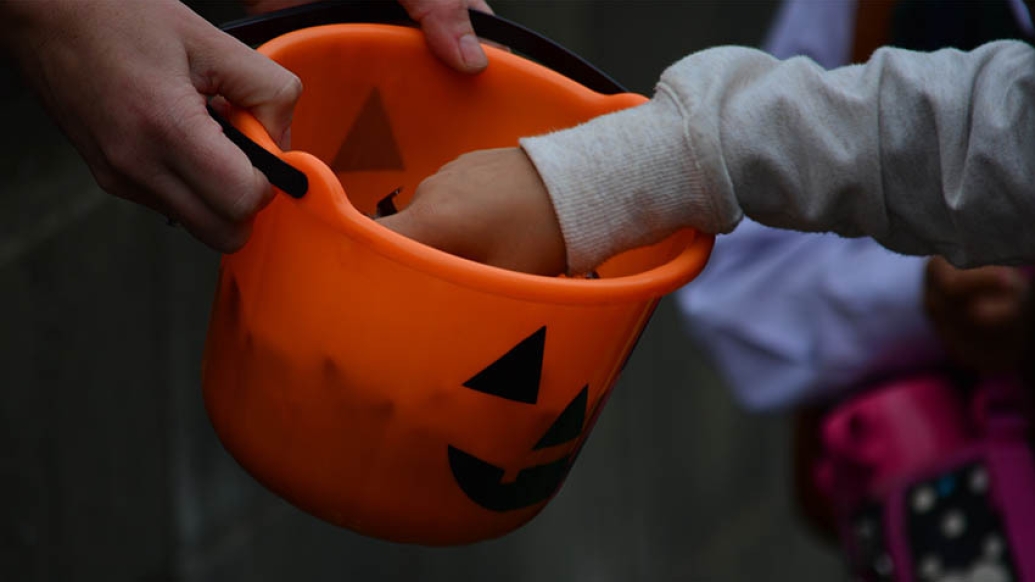Read through these tips (and tricks!) for ways to take some of the scary out of the holiday for children with special needs.
1:08 PM
Author |

Halloween is usually an exciting time for kids, but for those with special needs, like physical disabilities, sensory difficulties or food allergies, the popular holiday may feel more challenging than celebratory.
Experiences like trick-or-treating or attending Halloween parties are ones' children with these challenges may miss out on due to a lack of special accommodations or a fear of being singled out. But being able to participate in these festivities allows kids to feel more connected with friends at school.
"It gives them something to talk about with their peers," says Susie Steele, a pediatric physical therapist at Michigan Medicine. "It lets them be able to do their most important job as kids: play and have fun!"
SEE ALSO: More Merry than Scary: 11 Halloween Safety Tips for Parents
Even nonsocial events, like searching for Halloween costumes, can be disheartening for a child with a physical handicap.
Steele and Camron Moorehead, a pediatric occupational therapist at Michigan Medicine, offer parents tips on how to help their kid and others enjoy all the holiday has to offer.
Picking costumes
Whether buying or designing a costume, Steele and Moorehead say to keep these suggestions in mind:
-
Let the child's interest be your guide. Kids love to dress up like their favorite character, says Steele. If your child is excited about their costume, it'll show and the experience will be more enjoyable for them.
-
Get creative. If your child uses a walker or wheelchair, try to find a way to incorporate it into the costume. This also allows your child to have the necessary support to get around while trick-or-treating.
-
Minimize any risks. Moorehead says to avoid anything on a costume that could limit a child's mobility, obstruct their vision or cause anxiety. Not only could this cause them to trip and fall, but for children with sensory difficulties, an over-involved costume or certain textures of clothing can distract from all the fun.
Preparing for Halloween night
"While parents of a child with a disability might already be well aware of their child's triggers, it's best to prepare for the worst case scenario and go into the Halloween season proactively setting them up for the most success", says Moorehead.
-
Trial run. If you're the parent of a child with a disability, Moorehead and Steele recommend reviewing the route in advance. Go to a neighbor's house and practice trick-or-treating with your child before the big day. This can be especially beneficial to children who are sensitive to new situations or environments. When it's time for the real deal, stick to neighborhoods that you're both familiar with and areas that are well-lit at night.
-
Take advantage of community-based activities. Does your town host a spooky arts and crafts event? Or organize a trunk-or-treating affair? Indoor events, or events put on during the day, could feel like a safer, more welcoming option that allows children with a handicap to still enjoy all the excitement.
-
Avoid crowded areas. They can be overwhelming or distracting for children with certain disabilities. Big groups can also make crossing the street or going up and down curbs more dangerous.
-
Take breaks. All that walking can be tiring! To check in how everyone is feeling, allow time to rest by offering a candy break to your kids during your trick-or-treating journey.
LISTEN UP: Add the new Michigan Medicine News Break to your Alexa-enabled device, or subscribe to our daily updates on iTunes, Google Play and Stitcher.
Ways for everyone to be inclusive
Maybe you don't have a child with a disability, but you plan on passing out treats. When expecting trick-or-treaters there are simple ways you can better accommodate everyone involved in the fun:
-
Sit at the end of your driveway. If your house has stairs or you have a steep driveway, it may be challenging for some kids to knock on your door. Sitting closer to the road doesn't only help those on crutches or in a wheelchair, but it can also feel more inviting to an anxious trick-or-treater.
-
Keep on outdoor lights. Cracks or bumps in the sidewalk can make navigating a path especially tricky. Bright lights can help.
-
Describe the candy you give out. If you notice a child is blind or has limited vision, describe the types of candy you're offering and let them make a choice.
-
Give extra time. It can be difficult for children with special needs to reach quickly or accurately for a piece of candy, especially with other trick-or-treaters in the mix. Try not rush anyone through the candy picking process.
-
Offer non-edible treats. Remember that some children are limited in what they can eat or how they eat. Stickers, bubbles or glow sticks can be a great substitute for candy!
-
Be mindful of your decorations. Children with special needs may have a heightened sensitivity to loud noises, bright lights or unexpected sounds. Minimizing or turning off spooky decorations can reduce the chances of startling them.
-
Try not to judge. Moorehead and Steele explain that some children may not tolerate certain textures of clothing well, so they could not be wearing a costume. That doesn't mean they should miss out on the fun! Also keep in mind that some children may not be able to say the traditional "trick-or-treat" phrase because of an anxiety or being nonverbal.
"It's important to be aware of kids with disabilities because if there are ways we can help make them feel more included, it gives them a sense of normality and acceptance they don't always get to experience," says Moorehead.

Explore a variety of health care news & stories by visiting the Health Lab home page for more articles.

Department of Communication at Michigan Medicine
Want top health & research news weekly? Sign up for Health Lab’s newsletters today!





